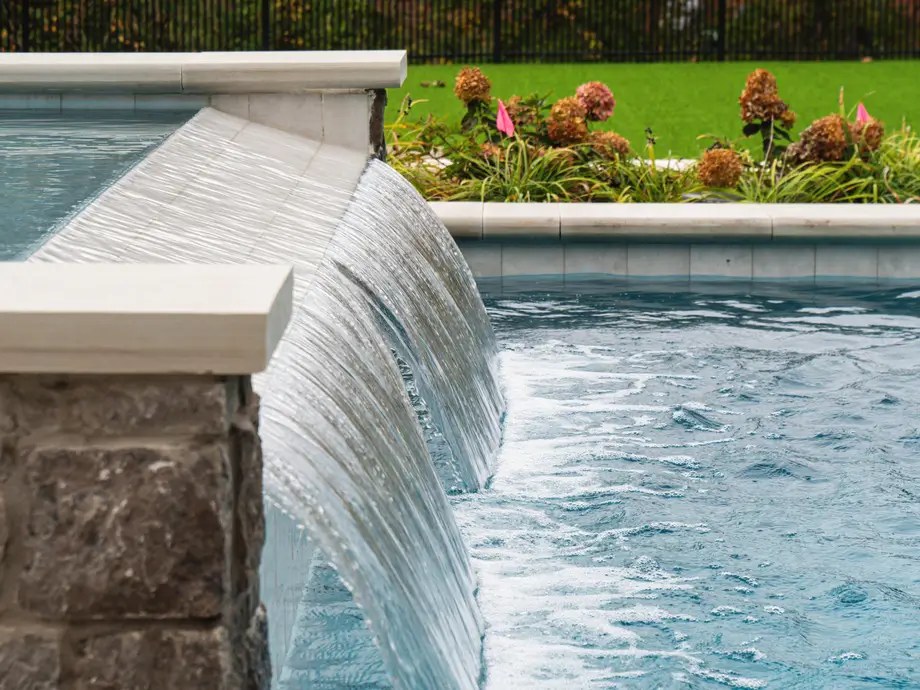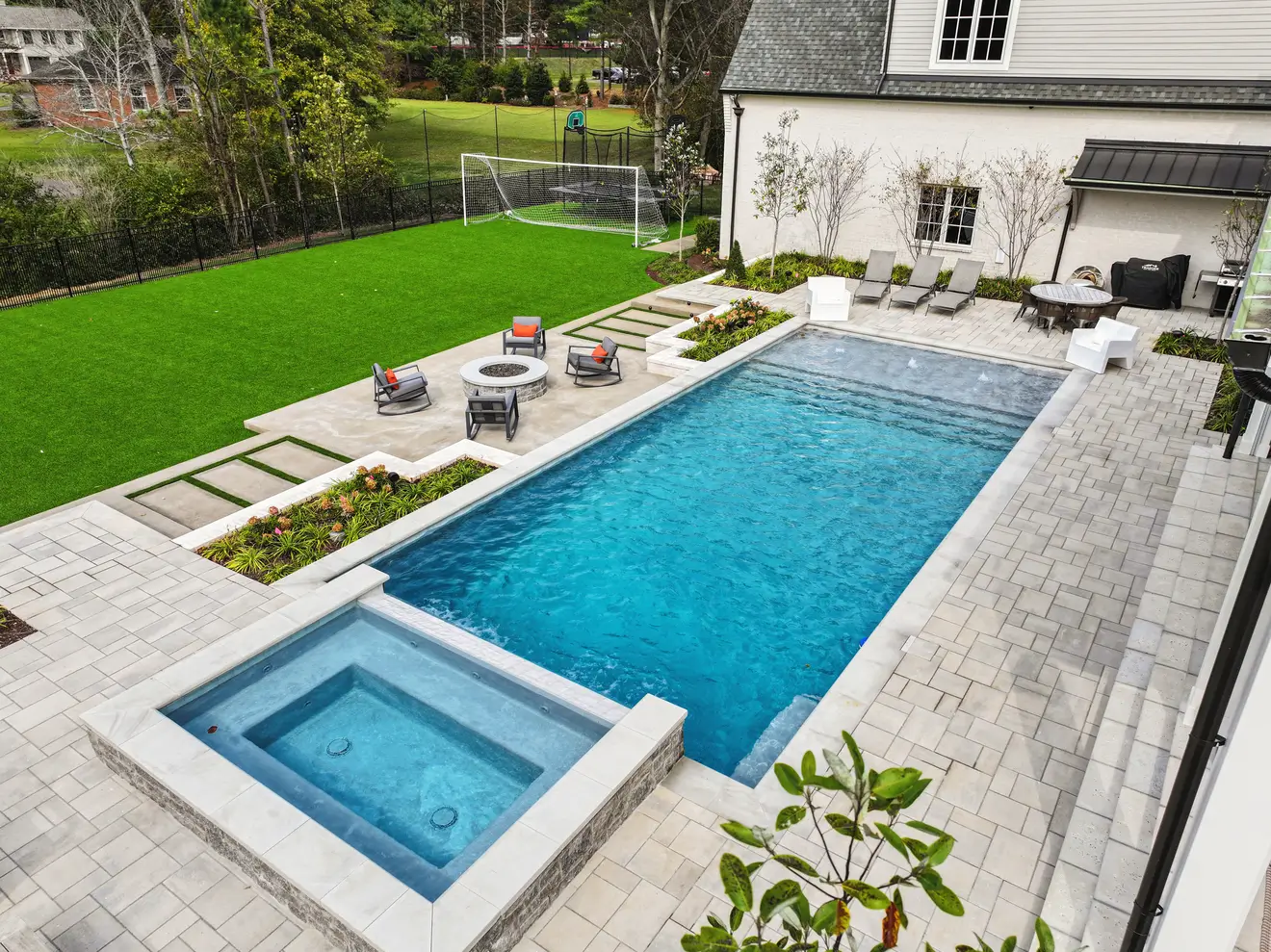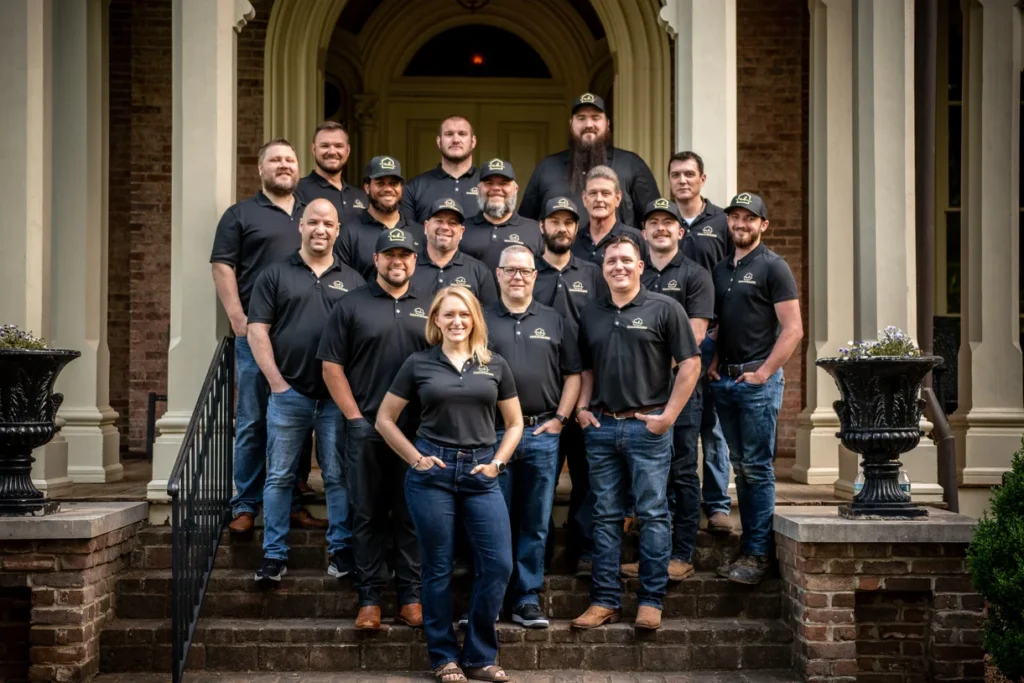Fiberglass vs. vinyl liner pools: which is better? How do each compare in terms of specifications, installation time, maintenance, and more?
If you’re investing in a new backyard pool, asking questions like these is essential. Doing so will help you find a long-lasting pool that stands the test of time and offers endless hours in an aquatic paradise that’s fun for the whole family.
If you’re looking for an impartial analysis of fiberglass versus vinyl liner pools, you’ve come to the right place. In this article, we’ll compare fiberglass and vinyl liner pools by looking at the following aspects of each:
- Customization options for both pools
- Installation times
- The interior surface of both pools, as well as the options available
- How durable and reliable each pool is
- Maintenance involved with each pool type
- To what extent algae grows on both fiberglass and vinyl liner pools
- The chemicals and electrical energy needed to power both pools
- The role of a pool builder in ensuring a quality backyard pool
Summary: Comparing fiberglass vs vinyl pools

| Fiberglass pools | Vinyl liner pools | |
| Customization options | 1. A variety of designs 2. You can add tanning ledges, benches, and seats. 3. Less costly | 1. More customization 2. More costly |
| Installation | 1. A matter of weeks | 1. A matter of weeks |
| Interior surface | 1. Smooth gelcoat resin that’s slip-resistant | 1. A 20-30 mil vinyl liner that needs replacing every 5+ years. |
| Durability | 1. Fiberglass surface and shell is very durable | 1. Vinyl liners can tear given that the liners are less than a millimeter thick |
| Maintenance | 1. You need to test pool chemistry at least on a weekly basis | 1. You need to test for algae on a weekly basis, and be prepared to replace liners after 5+ years |
| Algae growth potential | 1. Fiberglass material tends to be fairly algae-resistant | 1. Algae can grow around wrinkles and seams |
| Chemicals and electricity | 1. You can run a pump at shorter cycles and slower speeds than a vinyl liner pool 2. Requires weekly, if not daily, pH, alkalinity, calcium, and chlorine checks | 1. Tends to need more chemicals and electricity than fiberglass pools, but less than concrete pools 2. Requires weekly, if not daily, pH, alkalinity, calcium, and chlorine checks |
7 Areas to analyze with fiberglass vs. vinyl liner pools

While fiberglass and vinyl liner pools are constructed using different materials, they share commonalities across the following seven specifications that are common to all swimming pools:
- Customizable pool options
- Installation time
- Interior surface textures and options
- Durability and reliability
- Maintenance needed on the project
- Algae growth potential
- Chemicals and electricity needed to power the pool
We’ll dive into each of these in greater detail in the sections that follow.
Customization options with fiberglass and vinyl liner pools
In general, fiberglass pools tend to be about 16 feet wide, 40 feet long, and about 8.5 to 9 feet deep. While you can choose a wide variety of designs, you’re often limited to pre-designed molds.
Beyond size limitations, you can customize your pool with different features, tiles, jets, and lighting to create a one-of-a-kind aquatic experience. Fiberglass pools aren’t quite as customizable as vinyl liner pools, but you can add exquisite features such as tanning ledges, benches, and seats.
In contrast, when you purchase a vinyl liner pool, you can customize your pool at greater length, but doing so will add to the final cost. With fiberglass pools, you can add custom features, as they’re included in the overall pool cost.
Installation times
Whether building a fiberglass, gunite, or vinyl inground pool, the type of pool will help determine the total cost of ownership. For example, many installers state that fiberglass pools offer some of the fastest installation times on the market.
For example, from dig to swim, we can have your pool ready in just a matter of weeks. You’ll find it’s not uncommon to have a pool shell installed and filled with water in just one week. What’s more, with patio and deck installation, the entire process can take four to six weeks or less.
In terms of vinyl liner pools, the full construction process can be a bit longer. The installation process takes about six to eight weeks, which is still far shorter than the time to install a concrete pool.
In general, fiberglass pools tend to be installed the fastest of all pools, making them our preferred choice of the three common pool types.
Interior surface: textures and options
When talking about the interior surface of pools, fiberglass pools tend to last longer than other pools. The interior surface is created with resin material that’s called gelcoat.
This smooth material forms the basis of steps and tanning ledges. This slip-resistant texture is a joy to walk on, and it also makes for a safer swim.
In contrast, vinyl liner pools are smooth, but include a welded seam where one piece meets another. After about seven years, you’ll need to purchase a new liner, making vinyl liner pools a little more cumbersome than fiberglass pool projects.
But, compared to concrete pools, fiberglass and vinyl liner pools offer more options for customization of the surface of the pool.
Long-lasting durability and reliability
For fiberglass pools, one of the advantages is their durability. If gelcoat is applied well and is regularly maintained, you never need to refinish the gelcoat surface of a fiberglass pool. Fiberglass pools also include layers of material that provide them with strength and flexibility.
In contrast, vinyl liners for inground pools tend to be much thinner — 20-30 mils to be exact. That means that a sharp object, like dog claws or prongs from a toy can tear the liner. As such, fiberglass pools generally are easier to maintain as a pool’s vinyl liner tends to be very delicate.
Liners need to be replaced every five to nine years or so, even without major punctures.
When considering vinyl liner pools, keep in mind that wall panels can corrode or disintegrate. So, pool ownership with a vinyl liner pool means preparing for the pool walls to become brittle and need replacing.
As such, if we had to choose between a vinyl liner or fiberglass pool, we would choose fiberglass pools, simply because of the solid gelcoat’s durability.
Maintenance with fiberglass and vinyl pools
When looking at the pros and cons of pools in terms of hands-on maintenance, fiberglass pools and vinyl pools both tend to be relatively easy to maintain. Nevertheless, pool ownership requires maintenance.
For example, the gelcoat surface of a fiberglass pool is inert and won’t affect the pH levels in the water, so you need to test water chemistry often. But, maintenance with a fiberglass pool is a matter of maintaining water balance and sanitizer levels.
Because of the porous nature of vinyl liners, if you choose a vinyl liner pool, you’ll need to be more careful with maintenance to prevent punctures, tears, and the appearance of wrinkles.
Bumps can result in and around the liner, so if you need to drain the pool, you’ll also need to remove the liner.
Nevertheless, proper pool ownership and maintenance involve testing water chemistry often and balancing water levels with both fiberglass and vinyl liner pools. We advise daily or weekly testing.
Note: If you have any questions about pool testing, our pool professionals can help you with all your pool maintenance needs. Shoot us a line! We’re happy to help.
Algae growth
Pools also require care for bioorganisms like algae. As we explore the pros and cons of fiberglass and vinyl pools, know that the gelcoat of a fiberglass pool is algae-resistant. Nevertheless, algae can always grow around seams and pool steps, both of which are places where water circulation tends to be low.
When discussing algae growth, vinyl liner pools tend to accumulate algae around their seams. Overall, fiberglass and vinyl inground swimming pools tend to be better options regarding algae growth, as they tend to be more algae-resistant than concrete pools.
Chemicals and electricity needed
Speaking of algae, fiberglass pools tend to use fewer chemicals because algae doesn’t multiply like it does in vinyl liner or concrete pools.
In terms of energy, with fiberglass pools, when you’re removing debris from your pool, you can run a pump and filter in shorter cycles and at lower speeds to save energy. With that being said, vinyl liner pools tend to require more time and money to keep water chemistry in balance than fiberglass pools. But, the overall amount of time and money spent on both water chemicals and electricity to keep a fiberglass or vinyl liner pool in operation is still less than that of a concrete pool.
Overall, keep in mind that with both vinyl and fiberglass pools, you’ll need to balance alkalinity, pH, calcium hardness, and chlorine levels. Both of these dependable pools require regular maintenance.
Did you know?

Did you know that we do much more than just build pools? We’re also all about building custom homes and backyards.
For example, this backyard offers saltwater serenity, fire-lit nights, and a putting green to top it off. Thinking of switching it up in your backyard?
If you’re looking to transform your backyard for endless entertainment and relaxation, give us a call.⛳️🔥
Vinyl liner pools vs fiberglass pools: The best pool is one built by pool pros

So, which is better: fiberglass or vinyl liner pools? At the end of the day, the pool that’s best is the one that uses top-quality materials, is backed by industry-leading warranties, and is installed by an independently owned and operated pool team that places your best interests first.
That’s how we operate. Our Canaan pool builders work tirelessly to deliver a premium backyard pool product for families that’s second to none.
We show up at sunrise and leave after sunset because we believe pool owners deserve the best. A job isn’t done until it’s done. It’s our commitment to all of our customers.
Plus, with the market expected to grow for fiberglass pools, you couldn’t have picked a better time to get a quality pool built. We’re Middle Tennessee’s fastest pool builders. From dig to swim, you could be swimming in just a few short weeks.
Thinking about an upgrade for your home? Get in contact with one of our custom home and backyard pool builders.
They’d be happy to explore standard and premium-quality options for your new backyard oasis. We look forward to speaking with you soon.


